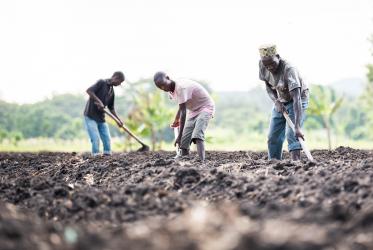Promoting responsible agricultural investments was the theme of a session organised by the World Council of Churches (WCC) at the Civil Society Policy Forum of the World Bank Group-International Monetary Fund Annual Meetings held in Washington DC from 9-13 October.
“There is no doubt we need to invest more in agriculture – it feeds us all and remains an important source of employment, especially for the world’s poor,” said Athena Peralta, WCC programme executive for economic and ecological justice, who moderated the session. However the critical questions are: “What type of investments? And more importantly, what kind of agricultural models do we want to support in the first place?”
Churches have been calling for life-giving or life-enhancing agriculture that prioritises farmers’ needs and livelihoods, nourishes and regenerates the ecosystems upon which the production of food fully depends as well as upholds just economic relationships among producers, investors, traders, and consumers.
October 16 is the World Food Day, and from 15-21 October, the WCC is inviting people to celebrate the Churches' Week of Action on Food.
Chris Jackson, senior economist at the World Bank and one of the panelists, pointed out that the World Bank is in accord with many of the principles of life-giving agriculture. Measured against them, “our existing global food systems are not quite delivering,” he admitted. In particular he noted that currently agriculture is a significant contributor to greenhouse gas emissions that cause climate change.
Jackson emphasised the importance of “de-risking” agriculture. He also highlighted the critical role the private sector can play in raising finance to promote rural development and to make agriculture more “climate-smart”. The World Bank, including through its private sector arm, the International Finance Corporation, aims to facilitate such investments.
However, in her presentation, Rosario Guzman, executive editor at Ibon Foundation, a socio-economic think tank in the Philippines, expressed concern over the World Bank’s promotion of the Global Index Insurance Facility as part of its climate-smart agriculture strategy. “Studies show that such insurance schemes encourage risky behavior as farmers tend to borrow more to buy chemical fertilisers and so-called improved seed varieties. They also tend towards mono-cropping which in the end makes them less resilient to a changing climate,” she said.
Further, Guzman observed that large-scale private investments have been associated with land grabbing in Asia and elsewhere.
Sasha Mentz, one of the founders of NicheUnity – a peasantry and agro-ecological hub – and small practitioner of organic farming in South Africa, noted that large-scale public-private partnerships in agriculture – such as the Alliance for a Green Revolution in Africa – have reaped benefits for big agricultural investors and corporations. At the same time, these initiatives have displaced many farmers across the region as well as “locked them into dependencies and indebtedness.”
The ecological consequences of these multi-million dollar agricultural ventures – namely, global warming, the poisoning of soils and rivers – are also increasingly apparent, she added.
Guzman and Mentz authored research texts commissioned by the World Council of Churches and Bread for All on the financialisation of food in Asia and Africa, respectively.
“We do not need massive corporate investments in agriculture,” said Guzman. “In the Philippine context, the redistribution of land to small farmers would do more in terms of lifting up rural livelihoods.”
Contrary to public perception, farmers are the biggest investors in agriculture in terms of time, labour and capital they put in.
Mentz agreed. “We have to shift away from investments in industrial, monocultural and input-intensive agricultural paradigms and instead support agro-ecological initiatives in line with the vision of life-giving agriculture,” she said. "The challenge of climate change is an enormous one and a radically different approach to agriculture is needed if we are to move towards a low-carbon world."
Whether the Word Bank could develop a more prescriptive approach to safeguard social and ecological standards in agricultural investments as well as finance alternative, community-rooted and ecologically-nourishing agricultural models remained key questions for further discussion.
Hungry for food, hungry for justice, hungry for peace (Pilgrimage of Justice and Peace blog, 13 October 2017)
Prayer services related to food justice
WCC Publication: Food and Finance: Toward Life-Enhancing Agriculture (pdf free for download)






